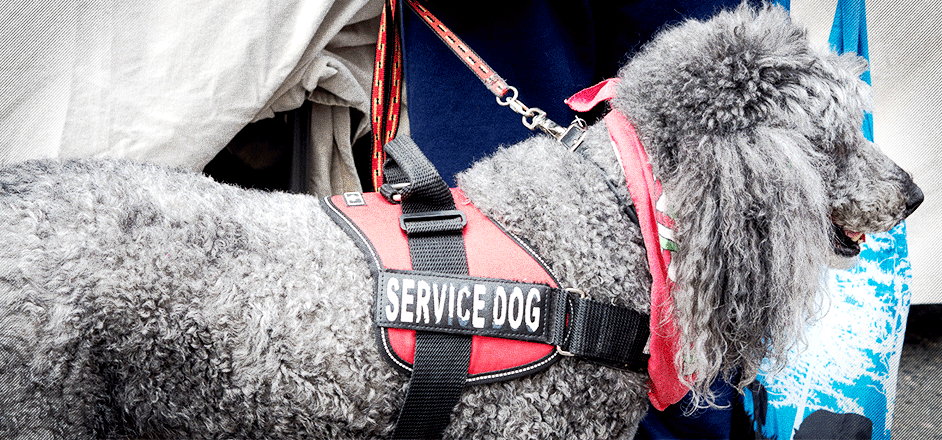When Brooklyn-based artist and YouTube performer, Ventiko, was told she couldn’t board her ‘emotional peacock’ named Dexter on a Newark flight in January 2018, the world chuckled. The idea that a giant exotic bird could be the source of emotional support seemed ludicrous. Ventiko persisted and later said, “The bird really changed [her] life in a positive way.”
Ventiko isn’t alone in claiming emotional support from animals. In 2014, a woman was escorted off a US Airways flight when her pig, named Hobie, defecated and squealed before the plane took off.
Traveller Jodie Smalley made headlines after taking her turkey on a pre-Christmas flight home in 2015. Cynics were surprised to hear that the bird made the return trip back in one piece.
Airlines allow some passengers with emotional or psychiatric problems to take therapy animals on board with them but the number of emotional support animals has been rising in recent years, sparking suggestions that people are abusing the system.
While these are extreme cases, the ease of obtaining a service animal permit online has lead to the wrong animals, with the wrong temperament, to don the red vest.
“My dog never went through traditional training,” Kevin Lane, 26, says almost proudly of his 5 pound chihuahua. “I got the permit, though, because it made it a lot easier to take her places, she gets terrible anxiety when she’s left alone too long – essentially, we provide support to each other.”
This isn’t how the system is supposed to work says a spokesperson for The Agency for Human Rights & Community Partnerships (HRCP) at the City and County of Denver. “We try our best to screen the animals before they get the permit, but the ADA (American Disability Act) makes it nearly impossible to deny the licenses. Not to mention, people can get them online for $22 and they’ll be overnighted – not even an interview with the patient or observance of the animal.”
Because service dogs perform essential tasks to help people, they are allowed to go in most public places, including into stores and restaurants. Business owners can question service dog owners, but they can only ask two specific questions: Is that a service dog, and what service does this dog provide? Store owners are not allowed to ask the service dog's owner about what their disability is under federal law.
“Some jackass brought in a terrier and it not only barked all night, it was aggressive to the wait staff,” says Chris Dutton, bartender at the Rialto Cafe in downtown Denver. “I knew it wasn’t a real service animal because it kept begging for food from the table but there was nothing I could do.”
Penalties for trying to pass off a service animal are no deterrent. According to the City and County of Denver website, tickets are only given after a verbal warning – and even then, a ticket is usually accompanied by a $50 fine.
“The problem is, pets that are passed off as service animals often attack real service animals who are trained to be passive,” the Denver spokesperson says. This was the case in July of 2018 when Humberto Rivera brought his bullterrier into a Best Buy in Aurora. The terrier immediately focused her sights on Mary Welling’s service Golden Retriever who is trained to help predict her seizures, get medical assistance when required, and provide company to Welling, who has late stage Multiple Sclerosis.
“It was a blood-bath,” Welling told officers who arrived on scene moments later. “I couldn’t get that dog off mine, I kept kicking it and yelling … everyone was yelling.” Rivera was given a citation and at court was given a verbal reprimand from the judge while Welling’s service animal had $7000 in vet bills for its injuries. “[My dog] isn’t a pet, she provides medical assistance that I need,” Welling said.
Fake service animals are becoming more and more common, especially in downtown Denver’s young college and hipster crowds. “My dog goes with me everywhere,” says Nick Mainer, 24. “I got him because I wanted a pet, but he gets a lot of attention because he’s so friendly. Women love him.” For $150, Mainer purchased a vest and certificate from a website, stating that Dino is a full service dog.
Mainer says he feels guilty about cheating the system, but adds that he has a number of friends on Capitol Hill who dot he same thing. “It’s not that big of a deal, in Europe animals are allowed everywhere, so, I don’t see the big deal.”
Indeed, France and the UK have no laws specifically barring animals from restaurants and stores, leaving the decision to the owner’s discretion. U.S. law is very clear – animals are not allowed in these establishments.
City officials are taking notice.
“We’ve sent business owners notices on how to contact animal control in the event there’s a suspicion or an episode where an imposter animal is included,” said a city spokesperson to Rooster. “We’re getting more and more serious and working with the City council to adopt stiffer penalties.”
Other municipalities are also attempting to curb the trend. The traditionally liberal city of Spokane is set to vote on a measure which will allow peace officers to question the patient about the animal and what it’s trained to do. Should they refuse to answer the patient could be fined $500 and the animal could be confiscated by the court.
Animal rights activists and activists for the disabled agree with these new ordinances citing the fact that imposter animals make the scrutiny on real animals harder.
Despite being unable to fly with the bird, Ventiko continues to take her peacock to restaurants and exhibits while she travels; alarming both business owners and guests. Adding that even she has a line. “I won’t take [the peacock] on the subway … she finds it too traumatizing.”



Leave a Reply
You must be logged in to post a comment.